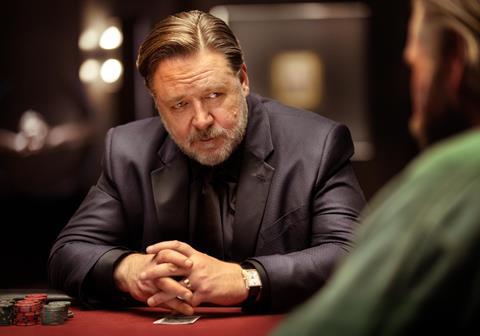Russell Crowe returns to the director’s chair for this Australian saga of a long night at the card table

Dir: Russell Crowe. Australia. 2022. 95 mins.
In Poker Face, a rich man staring down a grim future gathers his friends for a high-stakes night of poker, unprepared for the hand that’s about to be dealt. Russell Crowe’s second directorial feature tries to marry B-movie sleekness to a mournful study of regret, but the script’s shopworn elements never quite cohere. Playing the taciturn billionaire with a world of troubles, the Oscar-winning actor remains a commanding presence, lending this moody thriller some needed gravitas, although the twists and revelations ultimately prove underwhelming.
Poker Face ends up being a cautionary tale about appreciating what you have
After premiering at the Rome Film Festival, Poker Face — not to be confused with Rian Johnson’s forthcoming series of the same name — opens in US theatres on November 16. Crowe isn’t the box-office attraction he once was, and although this low-budget picture could appeal to ardent fans, a quick quick transition to VOD and streaming seems likely.
Jake (Crowe) has made a fortune in tech, figuring out how to turn online-poker software into a sophisticated surveillance program which he has happily sold to governments wanting to spy on their citizens. A longtime gambler, he sees the card table as a metaphor for life, but after receiving troubling news from his doctor, he organises a lavish get-together for his oldest buddies, including alcoholic Mikey (Liam Hemsworth) and dependable business partner Drew (RZA). Jake has surprises in store for his friends, but he’s unaware that a group of thieves are simultaneously planning to rob his compound of its priceless paintings.
Venturing into different terrain than his 2014 directorial debut The Water Diviner, Crowe delivers a familiar thriller that’s as much a heist film as it is a portrait of strained male friendship. Unfortunately, Poker Face overestimates how fascinating the audience will find Jake, whose brooding voiceover is meant to suggest a weary, conflicted soul facing a grand reckoning. Bearded and imposing, Crowe brings grizzled authenticity to the role, but his enigmatic billionaire isn’t striking enough for the mystery surrounding him to be captivating.
Similarly, Jake’s friends are thinly drawn, each of them harbouring their own dark secrets, some of which will directly impact him. Because the supporting cast is playing drab types — the self-absorbed politician, the philanderer, the drifting drunk — this reunion of estranged old friends doesn’t have much spark. That’s especially troublesome once Jake unveils his ominous ulterior motive for summoning them to his secluded estate, and the raised stakes that are supposed to occur as a result simply don’t materialise.
Crowe, who was also involved in the screenplay, adds a further complication with the arrival of some armed crooks, led by the dangerous Victor (Paul Tassone), who want to swipe Jake’s artwork. Potentially, their arrival could give the film an unpredictable new energy, forcing these friends to work together in this life-or-death crisis. But Crowe doesn’t demonstrate much ability to craft suspenseful sequences, and the finale’s action-laden payoff underwhelms.
Ultimately, the film’s more genre-y tendencies seem to be a distraction from what most interests Crowe, which is an exploration of a wealthy man’s realisation that money can’t buy everything. Still grieving a wife who died a decade ago, Jake has a good relationship with his daughter Rebecca (Molly Grace), yet he feels incomplete, a sentiment exacerbated by his doctor’s alarming diagnosis. Crowe conveys this gambler’s rugged vulnerability, suggesting a character at a spiritual crossroads, but Jake’s unexpected reason to invite his friends over for a guy’s-night poker tournament feels awfully contrived.
That said, cinematographer Aaron McLisky gives the proceedings a slick, dynamic look, the camera hovering over the shiny sports cars Jake gifts his pals and shooting his compound like a upmarket fortress. Production designer Hugh Bateup contrasts the man’s pristine, airless Sydney apartment with the warmer, man-cave aesthetic of this remote getaway, accentuating the sense that Jake’s poker night is an attempt to escape something — or, perhaps, return to a more carefree, adolescent state. (Flashbacks at the start of Poker Face show Jake and his friends as boys, their lives not without peril but far more innocent and joyful.)
Eventually, though, Jake’s hidden medical condition will come to light, resulting in an ending which is intended to be tearjerking. Crowe doesn’t yet have the confidence as a filmmaker to execute this final tonal switch. Poker Face ends up being a cautionary tale about appreciating what you have — ironic since this thriller doesn’t have a sufficient grip on any of its myriad elements to fully engage.
Production companies: Hamilton Entertainment, JBH Entertainment, Future Artists Entertainment, Fear Of God Films
International sales: Arclight Films, ryan@arclightfilms.com
Producers: Mark B. David, Matt Williams, Jason Clark, Jeanette Volturno, Ryan Hamilton, Ying Ye, Addam Bramich, Keith Rodger, Gary Hamilton
Screenplay: Russell Crowe, story and original script by Stephen M. Coates
Cinematography: Aaron McLisky
Production design: Hugh Bateup
Editing: Scott Gray, Matthew Woolley
Music: Matteo Zingales, Antony Partos
Main cast: Russell Crowe, Liam Hemsworth, RZA, Brooke Satchwell, Aden Young, Steve Bastoni, Daniel MacPherson, Paul Tassone, Elsa Pataky, Jack Thompson






![The Brightest SunScreen[Courtesy HKIFF]](https://d1nslcd7m2225b.cloudfront.net/Pictures/274x183/3/5/0/1448350_thebrightestsunscreencourtesyhkiff_312678.jpg)













![The Brightest SunScreen[Courtesy HKIFF]](https://d1nslcd7m2225b.cloudfront.net/Pictures/100x67/3/5/0/1448350_thebrightestsunscreencourtesyhkiff_312678.jpg)



